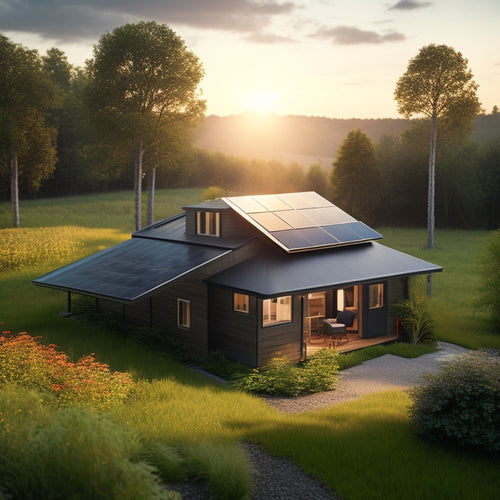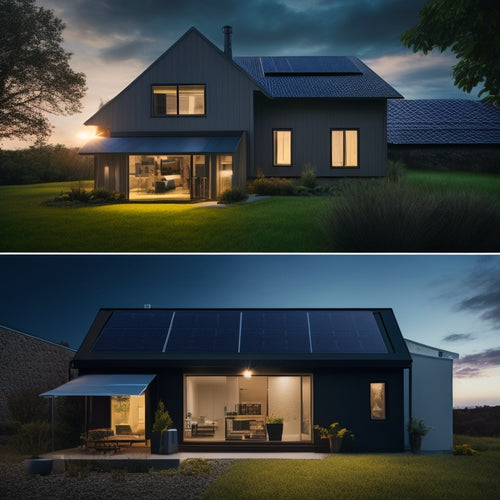
Cost of Home Battery Backup
Share
You can expect to pay between $8,000 and $15,000 or more for a home battery backup system, depending on the type and quality of the equipment, installation costs, and your specific energy needs. The total cost of ownership is influenced by factors like battery lifespan, maintenance requirements, and your energy usage patterns. A lithium-ion battery system, for example, can provide a lifespan of 10 to 15 years or more, leading to significant cost savings from reduced frequency of battery replacements. As you consider your energy independence options, understanding these factors will be key to finding the right solution for your home.
The Essentials
- The cost of a home battery backup system varies depending on the type and quality of the battery, with lithium-ion batteries being more expensive upfront.
- A typical home battery backup system can cost between $5,000 to $20,000 or more, including installation and equipment costs.
- The total cost of ownership is reduced by the longer lifespan of lithium-ion batteries, requiring fewer replacements and less maintenance over time.
- Installation of a home battery backup system can increase property resale value by up to $15,000, making it a valuable investment for homeowners.
- The cost of a home battery backup system can be offset by potential financial incentives, such as tax credits and rebates, for environmentally friendly upgrades.
Reliable Power During Outages
You expect your home battery backup system to provide power when you need it most - during outages.
A reliable system guarantees you have backup power for critical loads, such as refrigeration, lighting, and medical equipment.
A thorough home energy storage solution Residential Power Backup also protects sensitive electronics from damaging power surges and data loss.
Power When You Need
A reliable source of power during outages is essential for maintaining daily life and business operations. You know how frustrating it can be when the lights go out and you're left in the dark, wondering when the utility company will restore power.
With a home battery backup system, you can rest easy that you'll have power when you need it most. This means you can keep your refrigerator running, your lights on, and your communication devices charged. By leveraging lithium ion batteries and other renewable energy solutions Grid Scale Storage, you can guarantee a seamless shift to backup power during outages.
Having a reliable source of power during outages also means you can maintain energy independence. You're no longer reliant on the grid, which can be unpredictable and prone to outages. Instead, you can generate your own power and store it in your battery backup system.
This is especially important for emergency preparedness, as it guarantees you can keep your essential systems running even when the grid is down. With a home battery backup system, you can enjoy the peace of mind that comes with knowing you're prepared for any situation.
You'll have power when you need it, and you can maintain your independence from the grid. Whether you're dealing with a short-term outage or a prolonged emergency, you'll be ready.
Backup for Critical Loads
During extended outages, critical loads like refrigeration, lighting, and communication devices require a reliable backup power source to prevent food spoilage, assure safety, and maintain connectivity. As you consider a home battery backup system, it's crucial to identify the critical loads that need priority during an outage.
To make certain your essential appliances remain operational, you'll need to implement load prioritization strategies. This involves selecting the most critical devices and allocating sufficient power to them. Here's a sample configuration to illustrate this concept:
| Appliance | Power Requirement | Priority Level |
|---|---|---|
| Refrigerator | 1.5 kW | High |
| Lighting (3 bulbs) | 0.3 kW | Medium |
| Communication Device (router) | 0.05 kW | High |
| Microwave | 1.2 kW | Low |
| TV | 0.5 kW | Low |
Increased Property Value Boost
When you install a home battery backup system, you can expect a significant increase in your property's resale value.
In fact, having a reliable power protection system in place can give homeowners a sense of security and peace of mind, making their property more attractive to potential buyers.
This enhancement in value is largely due to the enhanced appeal of a home that can provide reliable power during outages, making it more attractive to potential buyers.
As a result, you'll be able to command a higher sale price, allowing you to recoup some of the initial investment in the battery backup system.
Boosted Resale Value
Increased property value is the tangible result of a strategic investment in home battery backup systems. You can expect a significant enhancement in resale value, as buyers are willing to pay a premium for homes with energy independence.
A study by the National Renewable Energy Laboratory found that homes with solar panels and energy storage systems like home battery backup sell for up to $15,000 more than similar homes without these features. This increased resale value is due to the market advantages that come with having a reliable source of home energy.
You'll attract more buyers and stand out from the competition, giving you an edge in a crowded real estate market. The eco-friendly appeal of home battery backup systems is a major draw for environmentally conscious buyers.
Additionally, financial incentives like tax credits and rebates can offset the installation costs, making your property investment even more attractive. As neighborhood trends shift towards sustainable living, having a home battery backup system will become a major selling point.
Enhanced Property Appeal
Serenity and self-sufficiency are the hallmarks of a modern home, and a home battery backup system is the key to revealing these coveted qualities. With a home battery backup system, you'll enjoy enhanced property appeal, which translates to increased property value. This increase in value is attributed to the system's ability to provide energy independence, sustainability benefits, and reduced environmental impact.
| Feature | Benefit | Value |
|---|---|---|
| Energy Independence | Reduced reliance on grid power | Increased property value |
| Sustainability Benefits | Reduced carbon footprint | Enhanced appeal to eco-conscious buyers |
| Environmental Impact | Reduced greenhouse gas emissions | Compliance with environmental regulations |
| Installation Costs | Potential for financial incentives | Increased ROI on installation |
| Maintenance Requirements | Minimal upkeep needs | Reduced maintenance costs |
With a home battery backup system, you'll experience increased grid reliability, reduced energy storage costs, and potential financial incentives through homeowner insurance discounts. Furthermore, technological advancements have made installation costs more affordable, making it a worthwhile investment for homeowners seeking to increase their property value.
Deep Cycle Battery Technology
You need to take into account two critical factors when evaluating deep cycle battery technology for your home battery backup system: battery lifespan factors and cycle life expectancy.
These factors greatly impact the overall performance and cost-effectiveness of your system. When selecting a deep cycle battery, it's crucial to take into account the off-grid energy storage needs of your home, as well as the type of solar charge controllers used to regulate the flow of energy.
Battery Lifespan Factors
As deep cycle batteries form the backbone of home battery backup systems, understanding the factors that influence their lifespan is essential for ideal performance and cost-effectiveness.
You need to take into account the impact of battery chemistry on lifespan, as different chemistries have varying lifespans. For instance, lithium-ion batteries generally outlast lead-acid batteries.
Maintenance practices also play a significant role, as regular monitoring and maintenance can extend the lifespan of your batteries.
Environmental impact is another factor, as extreme temperatures can reduce battery lifespan.
Charging efficiency is critical, as inefficient charging can lead to premature battery degradation.
When conducting a cost analysis, reflect on the upfront cost of the batteries, as well as the cost of replacement and maintenance over time.
Proper installation tips, warranty options, and safety considerations are also essential in ensuring optimal battery performance and lifespan.
Cycle Life Expectancy
The cycle life expectancy of deep cycle batteries plays an essential role in determining the overall performance and cost-effectiveness of home battery backup systems. As you consider investing in a home battery backup system, understanding the cycle life expectancy of deep cycle batteries is vital. This refers to the number of charge and discharge cycles a battery can handle before its capacity drops below 80%.
To give you a better idea, here's a breakdown of the cycle life expectancy of different deep cycle battery types:
| Battery Type | Cycle Life Expectancy |
|---|---|
| Lead-Acid | 200-500 cycles |
| Lithium-Ion | 3,000-5,000 cycles |
| Nickel-Cadmium | 1,000-2,000 cycles |
You'll notice that lithium-ion batteries have a considerably longer cycle life expectancy than lead-acid and nickel-cadmium batteries. This is because lithium-ion batteries are designed with advanced technology that reduces wear and tear, making them a more sustainable option with lower environmental impact. Additionally, proper maintenance practices, such as keeping the batteries at room temperature and avoiding deep discharges, can also extend their lifespan.
Check Your Energy Demands
You'll need to assess your energy usage patterns to determine the total power load required for your home battery backup system. This involves identifying the appliances you want to power during an outage and calculating their individual power requirements.
When considering renewable energy solutions, it's crucial to evaluate your energy demands in relation to your solar panel battery storage system renewable energy solutions. By understanding these demands, you can properly size your battery bank and guarantee it meets your energy needs.
Energy Usage Patterns
While sizing a home battery backup system, understanding your energy usage patterns is essential because it directly impacts the system's capacity and performance. You need to know how much energy you consume daily, particularly during peak hours, to determine the required battery capacity.
Analyzing your energy consumption trends helps you identify areas where you can improve residential energy efficiency.
Examine your past utility bills to understand your energy usage patterns. Look for patterns in your energy consumption, such as high usage during summer afternoons or winter mornings. This information will help you determine the required battery capacity and the number of batteries you need.
You can also use smart home energy monitors or advanced metering infrastructure to gather more detailed information about your energy usage. By understanding your energy usage patterns, you can optimize your home battery backup system's performance, reduce your energy bills, and increase your energy independence.
Appliance Power Requirements
Understanding your energy usage patterns sets the stage for evaluating the appliances that drive your energy demands.
Now, it's crucial to assess the power requirements of each appliance to determine the total energy load. This will help you choose the right battery capacity for your home battery backup system.
You'll need to calculate the wattage and voltage of each appliance, as well as the number of hours you use them daily. This information will help you identify which appliances are energy hogs and which ones are energy efficient.
Be sure to take into account the startup surge requirements for appliances like refrigerators and air conditioners, as these can greatly impact your energy demands.
Lithium-Ion Lasts Longer
When you opt for a lithium-ion home battery backup, you can expect a longer lifespan compared to other battery types.
You'll benefit from a higher number of charge cycles, typically between 3,000 to 5,000, which translates to a longer lifespan of 10 to 15 years or more.
This extended life cycle leads to significant cost savings and reduced maintenance needs over time.
Life Cycle Benefits
Kick in your home battery backup system and reap the benefits of lithium-ion batteries, which outlast their lead-acid counterparts by a significant margin.
With a lifespan of up to 15 years, lithium-ion batteries provide a longer cycle life, reducing the need for frequent replacements. This translates to significant cost savings over the life of the system.
You'll also enjoy the environmental benefits that come with choosing lithium-ion batteries.
With fewer replacements needed, you'll reduce electronic waste and the carbon footprint associated with manufacturing new batteries. Plus, lithium-ion batteries are recyclable, further minimizing their environmental impact.
When you factor in the cost savings and reduced environmental impact, it's clear that lithium-ion batteries are the smart choice for your home battery backup system.
By choosing a lithium-ion system, you'll enjoy a lower total cost of ownership and a clearer conscience.
With a longer lifespan and reduced waste, you'll be free to focus on what matters most - enjoying the freedom and security that comes with reliable backup power.
Frequently Asked Questions
Can I Install a Home Battery Backup System Myself?
You can attempt a DIY installation, but be aware of safety concerns and intricacies in choosing suitable battery types. Before proceeding, conduct a thorough cost analysis and follow installation guidelines to guarantee peak performance metrics.
Are Home Battery Backup Systems Compatible With Solar Panels?
You'll be interested to know that 80% of US homeowners consider energy independence a top priority. When it comes to solar compatibility, you'll find that most home battery backup systems, using advanced battery types like lithium-ion, seamlessly integrate with solar panels for a self-sufficient energy setup.
Do Home Battery Backup Systems Require Regular Maintenance?
You'll need to perform regular maintenance to verify your home battery backup system's ideal performance, which includes monitoring its performance, updating software, and replacing cells to extend battery lifespan, minimize maintenance costs, and assure system reliability.
Can I Use a Home Battery Backup System With a Generator?
When the going gets tough, you'll be glad you can use a home battery backup system with a generator, ensuring seamless generator compatibility and battery integration, giving you peace of mind and backup power when you need it most.
Are There Any Government Incentives for Home Battery Backup Systems?
You're eligible for federal tax credits and state rebates when installing a home battery backup system, which can offset installation costs and financing options, promoting renewable energy, energy storage, and grid independence while providing environmental benefits.
Final Thoughts
As you weigh the cost of a home battery backup, remember that reliable power during outages is priceless. It's the anchor that holds your family's comfort and security in place, even when the grid fails. With a battery backup, you're not just preparing for the unexpected - you're building a safety net that will last for years to come, like a solid foundation that keeps your home standing strong against life's storms.
Related Posts
-

Sustainable and Eco-Friendly Generators for a Reduced Carbon Footprint
Sustainable and eco-friendly generators are perfect for cutting your carbon footprint and increasing energy efficienc...
-

Diy Off Grid Solar
By embracing DIY off-grid solar, you can break free from grid dependence, slashing your energy bills by up to 90% and...
-

Cost of Home Solar Battery
You're looking to invest in a home solar battery to reduce your grid reliance, but you're curious about the cost. The...


